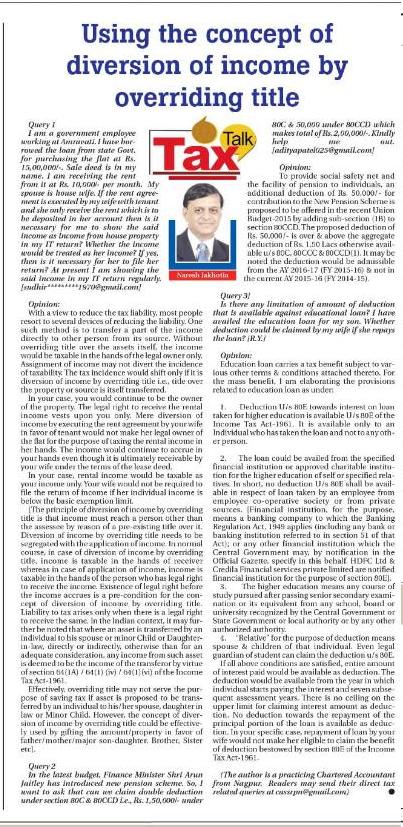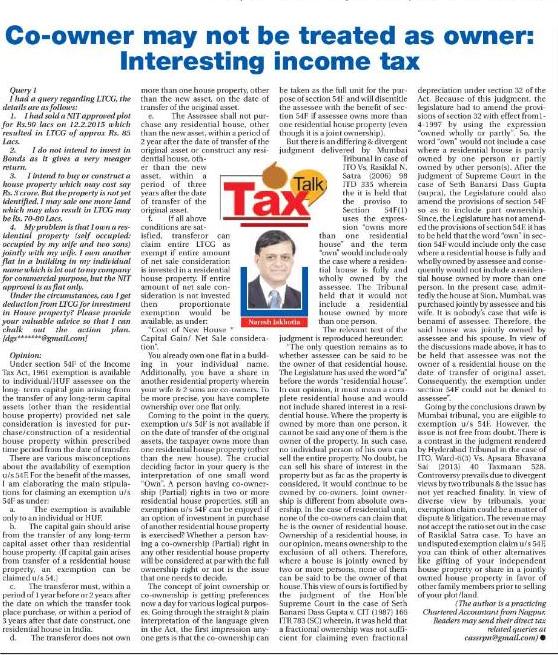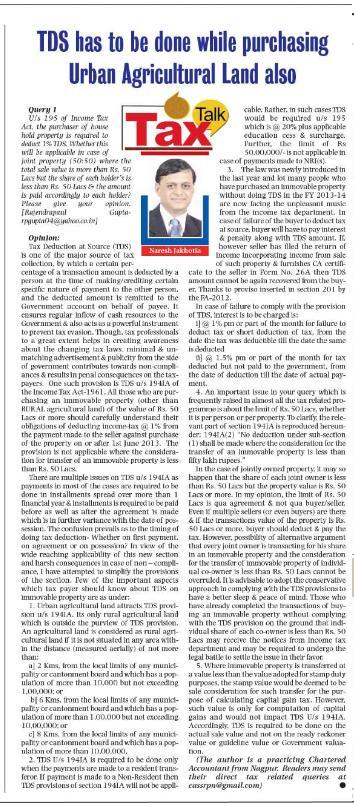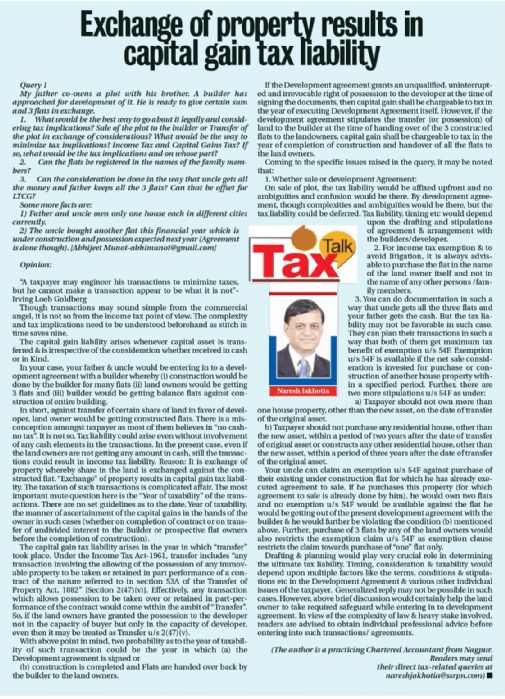Article Details
| Life Insurance Policies: No blanket escape from tax |
|
TAX TALK-16.03.2015-THE HITAVADA
TAX TALK CA. NARESH JAKHOTIA Chartered Accountant
Life Insurance Policies: No blanket escape from tax
Query 1] I have taken Postal Life Insurance Policy in Feb-2009 for Sum Assured (SA) Rs. 1,40,000/- for 7 years at a premium of Rs. 20,000/- per year. At that time, as per IT rules if yearly premium is less than 20% of SA, the maturity amount along with Bonus was Tax Free. I have surrendered the policy after completion of 5 years (in Aug-2014) due to need of funds. I was paid total Rs. 1,28,000/-. Actually, the amount to be paid was Rs. 1,42,000/- (including Bonus of Rs.36,000/-). Due premature withdrawal, the surrender value was less by Rs.14,000/-. My query is whether I have to pay tax on this bonus? From year 2011, as per IT rules the premium should be less than 10% of SA for getting exemption on Maturity amount. Whether that rule will be applicable in my case? If yes, then how much tax I have to pay? Whether the bonus accumulated before 2011, will it be tax free? [venkat.2804@rediffmail.com] One of the most important investments that an individual prefers for tax planning is investment in Life Insurance policies. Undoubtedly, it is also a part of strategic planning to provide for the future security for one's family in the event of any contingencies. It is always advisable to have appropriate level of life insurance so as to ensure long-term financial security and quality of life for the people you love most. Though insurance perspective should be the key criteria for investing in the life insurance policies, the tax advantage of investment should not be ignored while investing. There is general perception that all premiums paid against life insurance policy is eligible for deduction under section 80C within the overall cap of Rs. 1.50 Lacs. Further perception is that that all sums received from insurance company against life insurance policy is fully exempt under section 10(10D). But this is not 100% correct. Many who are not aware of this provision unknowingly ends up evading tax & carry the risk of attracting penal consequences. Deduction u/s 80C as well as u/s 10(10D) is available subject to some conditions as under: 1. Exemption u/s 10(10D): 2. Deduction u/s 80C: 3. Pension Plan:
Now, TDS Provision on Life Insurance maturity proceeds: People who have been escaping the tax man by not paying tax on income from policies such as the above are likely to be caught under this new provision. By the FA-2014, the Government introduced a new provision with respect to taxation of returns from life insurance policies. Now, all life insurance policies that are not eligible for tax exemption u/s 10 (10D) will attract TDS @ 2% on the sum paid to the policyholder. With the insurer deducting TDS on such policies, there will be a trail that will help the income tax department trace evaders. At the same time, the new provisions spare small investors. The provision will not be applicable in cases where the proceeds from a life policy in a year are less than Rs. 1 Lacs. The onus is on the insurer to deduct TDS on all policies where maturity proceeds are taxable. These will automatically come to the notice of the policyholder as also the IT Department about its taxability. It may be noted that that the tax liability of policy holder is not settled with TDS of 2%. Insurance policy receipts that are not eligible for tax exemption u/s 10 (10D) will be taxed as normal income at the individual’s slab rate.
In your specific case, the policy is issued in between 01.04.2003 to 31.03.2012 & premium amount in any of the year doesn’t exceed Rs. 20%. Resultantly, you don’t violate any of the conditions stipulated in section 10(10D). Entire maturity proceeds of Rs. 1.28 Lacs would be tax free. The premature withdrawals would not carry any tax implications also as it is done after a period of 5 years.
One important question emerges from your query is about the computation of taxable income if one fails to comply with the conditions of section 10(10D). Which amount would be taxable in such case? One prevailing view is that, since entire sum is exempt u/s 10(10D), violation would make entire receipt taxable. The other possible view is that amount received over & above the amount invested is the only amount that could be taxable. Further, possibility of treating the investment as capital assets and offering the income after indexation benefit as “Capital Gain” income could also not be ruled out in such cases. The issue is controversial & subject to all the possible interpretation as mentioned above. A suitable clarification by the CBDT would be in the interest of the tax payer as well as revenue. [The author is a practicing Chartered Accountant from Nagpur. Readers may send their direct tax related queries at SSRPN & Co, 10, Laxmi Vyankatesh Apartment, C.A. Road, Telephone Exch. Square, Nagpur-440008 or email it at cassrpn@gmail.com or upload it at www.ssrpn.com]. |
 |




.png)




